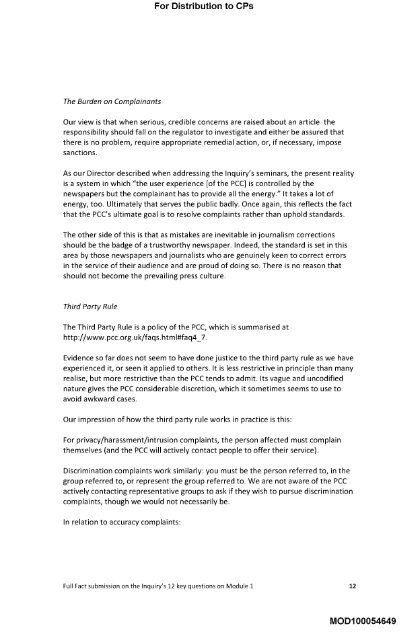Third Submission by Full Fact - The Leveson Inquiry
Third Submission by Full Fact - The Leveson Inquiry
Third Submission by Full Fact - The Leveson Inquiry
Create successful ePaper yourself
Turn your PDF publications into a flip-book with our unique Google optimized e-Paper software.
<strong>The</strong> Burden on Complainants<br />
For Distribution to CPs<br />
Our view is that when serious, credible concerns are raised about an article the<br />
responsibility should fall on the regulator to investigate and either be assured that<br />
there is no problem, require appropriate remedial action, or, if necessary, impose<br />
sanctions.<br />
As our Director described when addressing the <strong>Inquiry</strong>’s seminars, the present reality<br />
is a system in which "the user experience [of the PCC] is controlled <strong>by</strong> the<br />
newspapers but the complainant has to provide all the energy." It takes a lot of<br />
energy, too. Ultimately that serves the public badly. Once again, this reflects the fact<br />
that the PCC’s ultimate goal is to resolve complaints rather than uphold standards.<br />
<strong>The</strong> other side of this is that as mistakes are inevitable in journalism corrections<br />
should be the badge of a trustworthy newspaper. Indeed, the standard is set in this<br />
area <strong>by</strong> those newspapers and journalists who are genuinely keen to correct errors<br />
in the service of their audience and are proud of doing so. <strong>The</strong>re is no reason that<br />
should not become the prevailing press culture.<br />
<strong>Third</strong> Party Rule<br />
<strong>The</strong> <strong>Third</strong> Party Rule is a policy of the PCC, which is summarised at<br />
htt p://www.pcc.org.u k/faqs.ht m I#faq4_7.<br />
Evidence so far does not seem to have done justice to the third party rule as we have<br />
experienced it, or seen it applied to others. It is less restrictive in principle than many<br />
realise, but more restrictive than the PCC tends to admit. Its vague and uncodified<br />
nature gives the PCC considerable discretion, which it sometimes seems to use to<br />
avoid awkward cases.<br />
Our impression of how the third party rule works in practice is this:<br />
For privacy/harassment/intrusion complaints, the person affected must complain<br />
themselves (and the PCC will actively contact people to offer their service).<br />
Discrimination complaints work similarly: you must be the person referred to, in the<br />
group referred to, or represent the group referred to. We are not aware of the PCC<br />
actively contacting representative groups to ask if they wish to pursue discrimination<br />
complaints, though we would not necessarily be.<br />
In relation to accuracy complaints:<br />
<strong>Full</strong> <strong>Fact</strong> submission on the <strong>Inquiry</strong>’s 12 key questions on Module 1 12<br />
MOD100054649
















